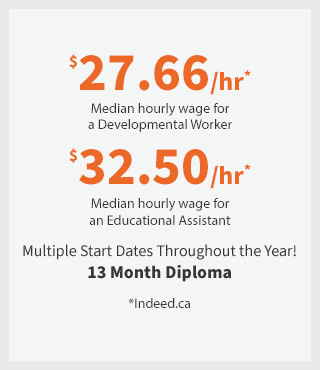Community & Developmental Service Worker Diploma Program
Learn via live instructor-led virtual lectures completely online.
Trillium College’s Community & Developmental Service Worker (CDSW) diploma program gives you the knowledge, practical skills and confidence to offer support as a community service worker. A community & developmental service worker can work along side a social worker who assists people of all ages with mental and physical disabilities or who face challenges with mental health and / or addictions. A service worker is trained to help those who struggle with a variety of social challenges.
This program gives you the skills needed to work as part of a social support team that works with individuals or community groups by facilitating appropriate social, physical and mental health services. You will develop skills as a community & developmental service worker in client assessment, client education, referral procedures, and effective monitoring of client treatments.
In addition, you will learn about the correlation between the mind and body in relation to our overall well being. You will also learn how a community & developmental service worker facilitates goal-planning and achievement strategies to help clients reach their full potential and play a vital role in society.
After completion of the in-class components as well as 40 hours of volunteer service, you will gain valuable professional experience in a placement experience.
Areas of Focus
This academic program covers information in the following subject areas:
- Becoming a Helping Professional in Human Services
- Utilizing Community Resources
- Understanding Issues of Diversity
- Working with High-risk Populations
- Working with Addiction and Mental Health Issues
- Dynamics within Families
- Communication Techniques and Processes
- Non-violent Crisis Intervention
- First Aid and CPR
- Ethics and Professionalism
- Structure, Function and Common Disorders of the Human Body
- Developmental Disabilities
- Fundamentals of Psychology and Sociology
- Interviewing and Counselling Strategies
- Concepts in Behavioral Management
- Pharmacology
- Legal Awareness, Reporting and Documentation
You will perform 40 hours of volunteer service in the community prior to beginning a community & developmental service worker placement. After completion of the in-class components and volunteer service, you will gain valuable professional experience in community and developmental support settings in a comprehensive placement experience.
Employment Opportunities
As a graduate of Trillium College’s Community & Developmental Service Worker (CDSW) diploma program, the opportunities you can pursue span nearly all aspects of human services. You may find employment as a life skills instructor, community development worker, community service worker, crisis intervention worker, developmental service worker, drop-in center worker, family service worker, group home worker, mental health worker, Aboriginal outreach worker, veteran services officer, welfare and compensation officer, addictions worker, women’s shelter supervisor, rehabilitation worker. Potential work settings for a community service worker may include community residences, private homes, recreation programs, schools, hospitals, social services, and government agencies.
Salary
According to updated information on *Indeed.ca
Admission Requirements
- Ontario Secondary School Diploma or Mature Student Status
- MTCU VSS Waiver
- Trillium College Immunization Report; completed and signed by a medical professional.
- Submission of a clear Police Check (CPIC) report with Vulnerable Sector Screening
- Completed Vulnerable Sector Screening waiver (VSS)









